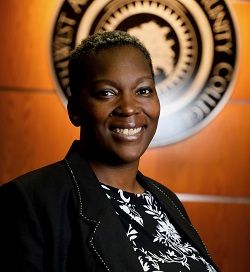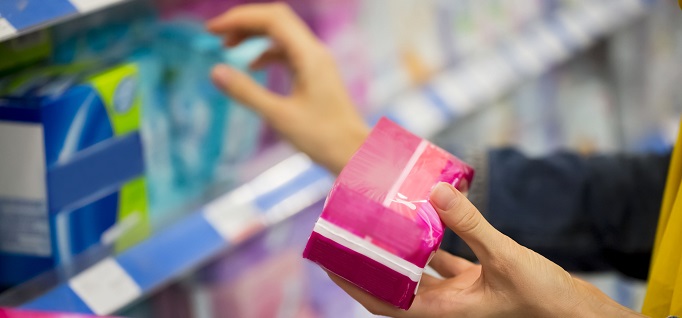Tackling period poverty
By AACC 21st Century Center Staff
December 3, 2020
A student at an Arkansas college campaigns for menstrual equality.
Low-income college students often have to make choices that lead them to drop out. Do they pay bills or buy food or get the car fixed, or do they go to class? For women, there’s another expense: feminine hygiene products.
This week in Massachusetts, Springfield Technical College’s Center for Access Services received pallets of Always brand pads to provide to students using the college’s food pantry.
“Because of the economic impact of the pandemic, many of our students are having to make difficult purchasing choices. The donation of the hygiene products will take some of the pressure off our students. They won’t have to choose between purchasing hygiene products and paying for food or staying in college,” said Jose Lopez-Figueroa, director of CAS, in a release.
Food pantries at many community colleges include feminine hygiene products along with other personal hygiene items.
Many state legislatures, including in California and Washington, also have considered bills that would make feminine hygiene products free and easily accessible in campus restrooms.
At an Arkansas college, one student is leading the charge to make feminine hygiene products accessible to all students.
In January, NorthWest Arkansas Community College (NWACC) student and mother Ronlisha (Ronnie) Nichols took on a new initiative on campus: free feminine hygiene products, or what she likes to call, menstrual equality.
“This is an initiative that I feel strongly about; I really felt like I needed to do something,” Nichols said in a release from the college.
When working at the information desk in the college’s student center, Nichols noticed numerous students stopping by on their way to the restroom and inquiring about menstrual products, as there were no dispensers in the bathroom. She would direct them to the stores on the main floor of the student center. However, many found the price to be an obstacle and would choose to drive home, not return, and miss class.
“Students were embarrassed and missing out on their education. That’s not right,” Nichols explained.
Nichols began working on a proposal for the initiative and brought it to Student Ambassador and Government Association (SAGA) members. Many could relate to the inconvenience, having to walk across campus to the student center to purchase a box, and then leaving because they couldn’t afford the cost.
“These products are expensive, but they are as much of a necessity as toilet paper,” Nichols said.
Nichols proposed to the NWACC Cabinet having a product dispenser in 40 women’s bathrooms around campus that would supply donated sanitary pads and tampons at no cost. The cabinet was on board.
She also brought her concerns to staff and faculty and many began bringing her menstrual product donations. Students who participate in the Service Learning Women’s Project also wanted to help support the mission.
“They showed up one day at my desk with garbage bags full of product!” Nichols said.
The pandemic – and subsequent budget cuts – have put Nichols’ project on hold, but there’s no doubt what she set in motion will not be forgotten.



